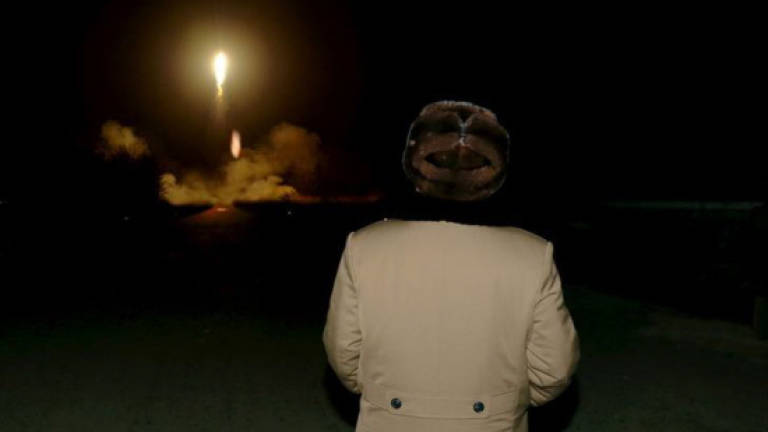N. Korea says missile tests simulated nuclear strike on South

SEOUL: North Korea said Wednesday its latest ballistic missile tests trialled detonation devices for possible nuclear strikes on US targets in South Korea and were personally monitored by supreme leader Kim Jong-Un.
Tuesday's test firing of three missiles in violation of existing UN resolutions was seen as an angry reaction to the planned deployment of a US missile defence system in the South.
The launch of the two Scud missiles and one intermediate-range Rodong was condemned by the United States, Japan and South Korea, who vowed a collective diplomatic response.
The tests were ordered and monitored by Kim Jong-Un and the range of the missiles was limited to simulate pre-emptive attacks on South Korean ports and airfields hosting US military "hardware", the North's official KCNA news agency said.
The tests "examined the operational features of the detonating devices of nuclear warheads mounted on the ballistic rockets at the designated altitude over the target area," it said.
According to the South Korean military, the two Scuds flew between 500 and 600km into the Sea of Japan, while the Rodong was fired about an hour later.
A photo from the test, published on the front page of the North Korean ruling party's Rodong Sinmun newspaper, showed Kim sitting at a desk covered by a large map of the Korean peninsula.
The map was clearly marked with a possible missile flight path from the North to South's southern coast, around the major ports of Ulsan and Busan.
'Deeply troubling'
UN Secretary-General Ban Ki-moon on Tuesday said the tests were "deeply troubling" and undermined efforts to reduce tension on the Korean peninsula.
UN resolutions prohibit North Korea from developing ballistic missile technology.
Pyongyang has repeatedly warned of pre-emptive nuclear strikes against the South and US targets there and elsewhere, although the main focus of its nuclear weapons programme is to develop a credible strike threat against the US mainland.
A series of missile tests this year aimed at backing up that threat led to the recent agreement between Seoul and Washington to deploy the sophisticated US Terminal High Altitude Area Defense system, or THAAD, in South Korea.
Last week, Pyongyang responded to the announcement by threatening to take "physical action".
There are nearly 30,000 US troops permanently stationed in South Korea.
North Korea-US tensions had already been stoked by Pyongyang's fury at Washington's decision to personally target leader Kim with sanctions related to human rights abuses.
The North test-fired a submarine-launched ballistic missile on July 9, following back-to-back tests of a powerful new medium-range missile on June 22.
Those two missiles achieved a significant increase in flight distance over previous failed launches and were believed to be of a much-hyped, intermediate-range "Musudan" — theoretically capable of reaching US bases as far away as Guam.
Technical breakthroughs
Since carrying out a fourth nuclear test in January, which prompted a significant tightening of UN sanctions, North Korea has claimed a series of technical breakthroughs for its weapons programme.
It said it had miniaturised a nuclear warhead to fit on a missile and successfully tested an engine designed for an inter-continental ballistic missile that could reach the US mainland.
While some experts say the claims are exaggerated, most acknowledge that the North's nuclear and ballistic missile programmes have made significant strides.
In a separate dispatch on Wednesday, KCNA quoted a spokesman for the Korean People's Army (KPA) unit based in the border truce village of Panmunjom calling for all US troops to leave the South immediately.
"The KPA already solemnly declared that the US imperialist aggression forces in South Korea are its first strike target," the spokesman said.
"The US should go back home, abandoning its wicked intention for a permanent stay in South Korea," he added. — AFP